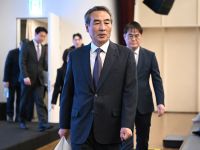By Albawaba.com-MEBG’s correspondent in Tripoli
Libya, one of North Africa’s more controversial countries is easing itself back into the international business fold. This comes after a decade of stagnation, brought on by the UN sanctions imposed against it because of its prolonged refusal to hand over suspects in the 1988 bombing of a Pan Am flight over Lockerby, Scotland.
The sanctions were lifted in April 1999, after a compromise agreement resulted in two Libyan officials being sent to trial in a Scottish court—temporarily located off British soil in Holland. And so, after 10 long years, Libya is intent on getting itself back onto the world economic map.
A step in that direction was taken in mid-November, when for the first time ever the Libyan capital of Tripoli hosted a privately financed and organized conference, which was designed to investigate foreign investment opportunities in the country.
The conference attracted some 170 distinguished guests from 106 private companies, organizations and international bodies. While most of the guests flew in from European and Arab countries, there were members of the international business community from as far a field as Australia and Japan.
The conference organized by a consortium that included the Libyan Board of Foreign Investment, London-based CWC Associates and the Libyan Sahara Tours. The logistics of producing the event was a phenomenon in and of itself. All the relevant ministers and government officials were present, on the orders of the country’s leaders Mu’ammar al-Qadhafi. Indeed, the often-reclusive Al-Qadhafi even made an unexpected appearance to the conference.
The Tripoli meeting was designed as a platform for foreigners to gain an insight into investment opportunities in Libya, and to get a feel for the business climate that exists in the country. And, at least on the surface, it appeared to be a case of the foreign business community having to adjust to Libyan norms, rather than the other way around.
Indeed, if Al-Qadhafi address to the conference was anything to go by, Libya will not be going through an overall reformation of its economic and political systems. Far from that, Qadhafi rejected any investment that is based on “exploitation and not on cooperation”. He noted that throughout history “foreign investment and freedom of market were used only to enter the country and destroy the local economy”. In Libya, he said, “Workers are partners in protection” thus no speculative investment will be accepted.
Foreign investment in Libya has to be “based on comprehension,” Omar El-Mountaser, the conference’s chairman and general secretary of the country’s General Planning Council, adding that “investment means partnership.” El-Mountaser said he was placing great hope in foreign investment, which he expects to total more than $35 billion within the coming five years. Currently, foreign investment in Libya can be done in two ways—either through the establishment of a Libyan company or by way of a joint venture.
Despite the fact that Libyan oil industry is key to the country’s economy and its predominant source of foreign exchange, the government intends attracting foreign investment into other sectors such as industry, the health services, tourism and additional areas, as well as agriculture.
To attract foreign investors, Libya started in a first step to apply its famous Law no. 5 “Concerning Encouragement of Foreign Capital Investment,” which was passed in 1997. The objective of its law is to attract foreign investment.
Mohamed R. Abuhoul, the investment department Director of the Libyan Foreign Investment Board, which is the executive body in charge of administrating foreign investment and was founded as a result of the new investment law, told Albawaba.com-MEBG that Libya’s development over the past decades occurred too rapidly, and only was enjoyed by a small percentage of the population.
“But we neglected the heart of the development–our society, Abuhoul said. “Our self-evaluation was wrong. Now we want to be part of that world that changes. That is why we want to make foreign investors our partners and learn from them.” — (Albawaba.com - MEBG)








